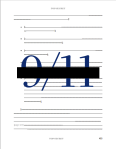
Following through on intentions he announced earlier this week, Senator Rand Paul today offered an amendment to the pending National Defense Authorization Act (NDAA) that would require the president to declassify 28 pages on foreign government links to the 9/11 hijackers. The language is identical to S.1471, the bill Paul introduced on Monday with Senators Ron Wyden and Kirsten Gillibrand.
In a story on Paul’s new move, The Hill’s Julian Hattem said the proposed amendment (No. 1680) “heightens the profile of the fight and may increase the stakes for the opponents.”
Speaking via press release, Paul said, “For over 13 years, the family members of the victims of September 11, 2001 terrorist attacks have been deprived of the details surrounding the redacted 28 pages of the 9/11 Congressional Inquiry. I firmly believe the American people deserve a government that instills trust and a restoration of their sense of security, and think my amendment is a step in the right direction.”
Flushing Opponents of the 28 Pages Movement into Daylight
While there are a growing number of vocal champions of the declassification of the 28 pages, those who want the 28 pages kept under wraps have worked quietly and effectively out of public view.
As we wrote earlier this year, “It’s likely that among the most powerful of those unseen opponents of 9/11 transparency are two strange bedfellows: The Kingdom of Saudi Arabia—which has fueled the growth of terror, and the U.S. intelligence community—which is charged with thwarting terror.”
Paul’s amendment to the must-pass NDAA could force some of those opponents—and, more specifically, their Senate allies—out of the shadows.
In addition to Wyden and Gillibrand, there are 11 other senators who, if they are consistent on principle, should support Paul’s amendment. Senators Patrick Leahy (VT), Barbara Mikulski (MD), Harry Reid (NV), Barbara Boxer (CA), Patty Murray (WA), Dick Durbin (IL), Jack Reed (RI), Chuck Schumer (NY), Bill Nelson (FL), Tom Carper (DE) and Maria Cantwell (WA) each signed a 2003 letter asking then-President George W. Bush to release the 28 pages.
Similar 2003 Move Thwarted by McConnell
This isn’t the first time a senator has tried to elevate the 28 pages by way of an amendment to a bill. In October 2003, North Dakota Democrat Byron Dorgan offered an amendment to the Foreign Operations, Export Financing and Related Programs Appropriations Act, urging Bush to reverse his decision to redact the 28 pages.
Dorgan offered the amendment twice, but was thwarted on each attempt by then-GOP Senate Majority Whip Mitch McConnell, who objected and claimed that the amendment was not germane to the legislation. (For transcripts of that debate—which included a supporting speech from Senator Bob Graham—click here and here.)
McConnell, who is now Senate Majority Leader, recently engaged in a high-profile—yet cordial—parliamentary battle with Paul over the extension of the PATRIOT Act.
Where Dorgan’s “sense of the Senate” amendment would have urged the president to declassify the 28 pages, Paul’s language is more forceful. His amendment and bill each say that, not later than 60 days after the NDAA’s enactment, “the president shall declassify and release to the public the previously redacted portions” of the report of the joint intelligence inquiry where the 28 pages are found.
Protecting “Sources and Methods” or Preventing Embarrassment?
However, the language may also offer President Obama an opportunity to continue his administration’s refusal to release the 28 pages, as it says he is not required to declassify sources and methods if that release would “result in imminent lawless action or compromise presently on-going national security operations.”

In 2003, Bush invoked “sources and methods” when defending his decision to classify the pages, saying “Declassification of that part of a 900-page document would reveal sources and methods that would make it harder for us to win the war on terror. … It would help the enemy if they knew our sources and methods.”
Among many who have read the 28 pages, Congressman Walter Jones denies that declassification would harm national security in any way, pointing to other motives for the secrecy. “There’s nothing in it about national security. It’s about the Bush administration and its relationship with the Saudis,” Jones told The New Yorker.
